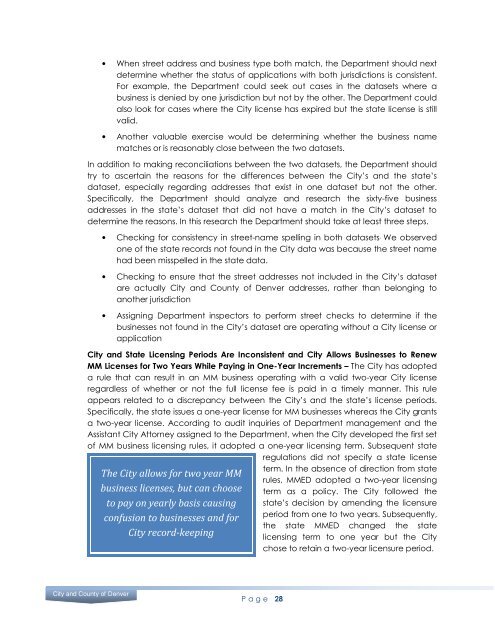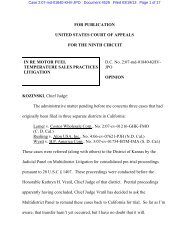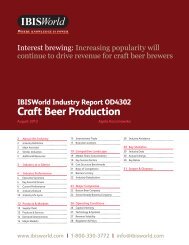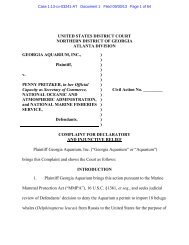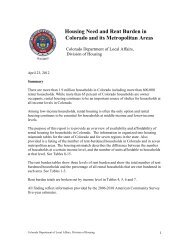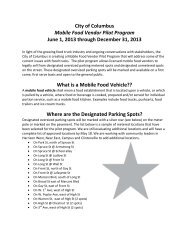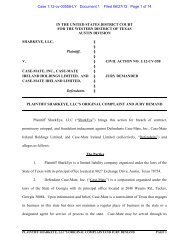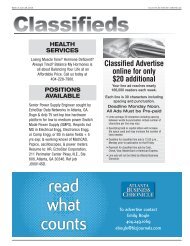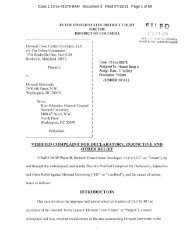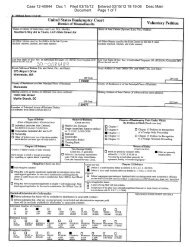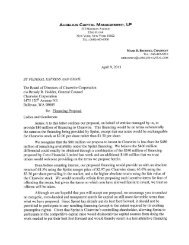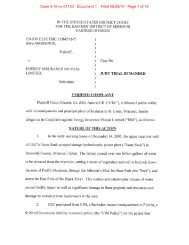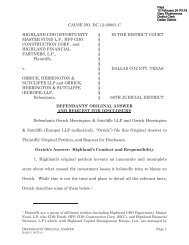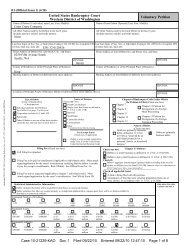• When street address <strong>and</strong> business type both match, the Department should nextdetermine whether the status <strong>of</strong> applications with both jurisdictions is consistent.For example, the Department could seek out cases in the datasets where abusiness is denied by one jurisdiction but not by the other. The Department couldalso look for cases where the <strong>City</strong> license has expired but the state license is stillvalid.• Another valuable exercise would be determining whether the business namematches or is reasonably close between the two datasets.In addition to making reconciliations between the two datasets, the Department shouldtry to ascertain the reasons for the differences between the <strong>City</strong>’s <strong>and</strong> the state’sdataset, especially regarding addresses that exist in one dataset but not the other.Specifically, the Department should analyze <strong>and</strong> research the sixty-five businessaddresses in the state’s dataset that did not have a match in the <strong>City</strong>’s dataset todetermine the reasons. In this research the Department should take at least three steps.• Checking for consistency in street-name spelling in both datasets . We observedone <strong>of</strong> the state records not found in the <strong>City</strong> data was because the street namehad been misspelled in the state data.• Checking to ensure that the street addresses not included in the <strong>City</strong>’s datasetare actually <strong>City</strong> <strong>and</strong> <strong>County</strong> <strong>of</strong> <strong>Denver</strong> addresses, rather than belonging toanother jurisdiction• Assigning Department inspectors to perform street checks to determine if thebusinesses not found in the <strong>City</strong>’s dataset are operating without a <strong>City</strong> license orapplication<strong>City</strong> <strong>and</strong> State Licensing Periods Are Inconsistent <strong>and</strong> <strong>City</strong> Allows Businesses to RenewMM Licenses for Two Years While Paying in One-Year Increments – The <strong>City</strong> has adopteda rule that can result in an MM business operating with a valid two-year <strong>City</strong> licenseregardless <strong>of</strong> whether or not the full license fee is paid in a timely manner. This ruleappears related to a discrepancy between the <strong>City</strong>’s <strong>and</strong> the state’s license periods.Specifically, the state issues a one-year license for MM businesses whereas the <strong>City</strong> grantsa two-year license. According to audit inquiries <strong>of</strong> Department management <strong>and</strong> theAssistant <strong>City</strong> Attorney assigned to the Department, when the <strong>City</strong> developed the first set<strong>of</strong> MM business licensing rules, it adopted a one-year licensing term. Subsequent stateregulations did not specify a state licenseThe <strong>City</strong> allows for two year MMbusiness licenses, but can chooseto pay on yearly basis causingconfusion to businesses <strong>and</strong> for<strong>City</strong> record-keepingterm. In the absence <strong>of</strong> direction from staterules, MMED adopted a two-year licensingterm as a policy. The <strong>City</strong> followed thestate’s decision by amending the licensureperiod from one to two years. Subsequently,the state MMED changed the statelicensing term to one year but the <strong>City</strong>chose to retain a two-year licensure period.<strong>City</strong> <strong>and</strong> <strong>County</strong> <strong>of</strong> <strong>Denver</strong>P a g e 28
The <strong>City</strong>’s Code requires that MM licenses “shall be valid for a period <strong>of</strong> two (2) yearsfrom the date <strong>of</strong> issuance.” 33 However, the Code also allows MM establishments to payfor only one year <strong>of</strong> the license renewal. If it chooses to pay for one year, the licenseemust pay for the second year before the one-year anniversary <strong>of</strong> the two-year license.We identified several weaknesses with this policy. First, because the business has a validtwo-year license in h<strong>and</strong>, it can be confusing to MM license holders, who may notunderst<strong>and</strong> why they have to pay a fee in the middle <strong>of</strong> the license period, <strong>and</strong> itremoves the incentive for these licensees to pay the second half <strong>of</strong> the license fee in atimely manner. Further, with the payment processing weaknesses <strong>and</strong> lack <strong>of</strong>reconciliation discussed earlier in this report, the Department has limited ability to ensurethe renewal <strong>and</strong> late fees discussed in the previous section are paid.To better align <strong>City</strong> <strong>and</strong> state MM licenses <strong>and</strong> help ensure license fees are paid timely,the Department should request that <strong>City</strong> Council review <strong>and</strong> possibly revise the <strong>City</strong> rulespertaining to two-year licensing, or make changes to the current <strong>City</strong> rules to requirecomplete payment <strong>of</strong> licensing fees before a two-year license is issued.Issues Identified Have Several Negative Effects <strong>and</strong> Pose Substantive Risks tothe <strong>City</strong>Of all the items identified, several issues are <strong>of</strong> particular concern. First, there are MMestablishments in the <strong>City</strong>, especially OPCs <strong>and</strong> MIPs, that are operating without a valid<strong>City</strong> license. The licensing process is intended to provide assurance that MMestablishments are qualified <strong>and</strong> operating safely. The system has not served this functionif certain applications or businesses are able to operate without a valid license.Second, the Department does not know how many MM establishments are operating in<strong>Denver</strong>, <strong>and</strong> the <strong>City</strong> cannot provide a reliable map <strong>of</strong> MM businesses. For a variety <strong>of</strong>reasons discussed in this report, there has been confusion about whether a business is“licensed” when the application is still in process. Department personnel can checkindividual businesses to determine if the business has applied but are not licensed, butthey cannot run a report showing the accurate status <strong>of</strong> every MM business in the <strong>City</strong><strong>and</strong> <strong>County</strong> <strong>of</strong> <strong>Denver</strong>.Finally, although most MM businesses operating without a valid MM license have likelyapplied for a license that has not been issued yet, the <strong>City</strong> does not know which have<strong>and</strong> which have not. Those that have not result in lost revenue to the <strong>City</strong>. Specifically,MM businesses that have neglected to apply are not paying application <strong>and</strong> licensingfees due the <strong>City</strong>, may not have a sales tax license, <strong>and</strong> may not be submitting salestaxes due to the <strong>City</strong>.Department staff reported that the <strong>City</strong> is “saturated” with MM businesses, meaning thatdue to the restrictions on where MM businesses can be located, there are very few if anyavailable locations left to house a new MM business. If this is the case, the risks associatedwith many <strong>of</strong> the MM business-related issues identified in this report are reduced because<strong>of</strong> the reduced likelihood <strong>of</strong> getting new MM license applications. However, these issues33 D.R.M.C., §24-513(a).P a g e 29Office <strong>of</strong> the <strong>Audit</strong>or


